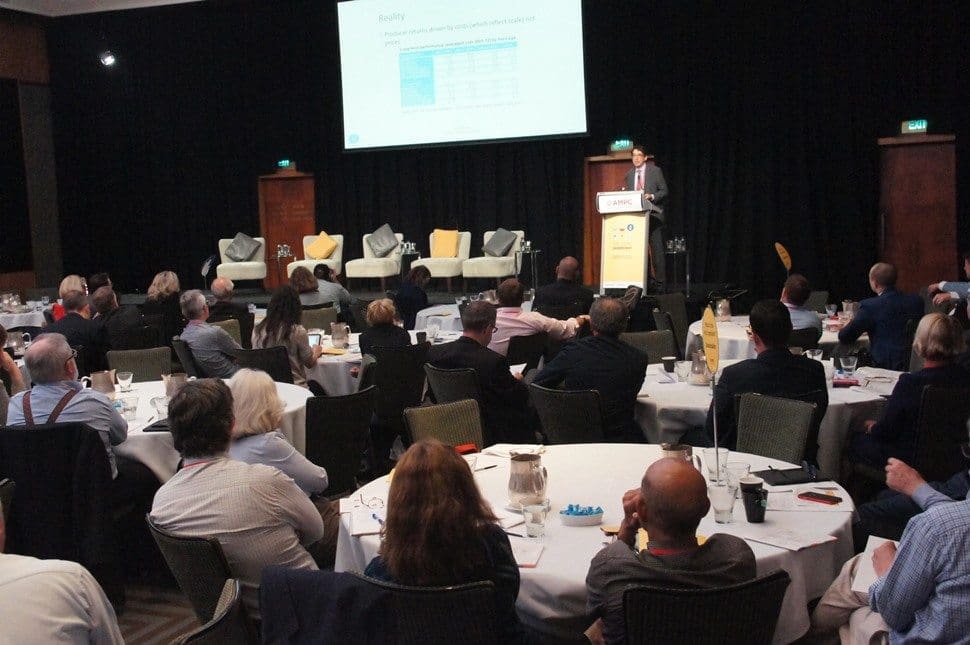
Delegates at AMPC’s conference in Sydney yesterday
Improving international competition whilst reducing industry regulation were two issues to dominate the agenda of the first day of the Vital Ingredient Sustainability Conference, hosted by the Australian Meat Processor Corporation (AMPC), in Sydney today.
The Vital Ingredient Sustainability Conference, the first to be held by the AMPC, was attended by a gathering of meat processing industry stakeholders to provide a platform where members, scientists, academics, consultants and producers could share some of the research, information and best practice that will help build a thriving industry.
“Sustainability is critical to our long-term success. The red meat industry is the foundation on which many rural communities are built,” said AMPC Chairman Peter Noble in his opening address.
Identified as two of the six risks facing the $23 billion red meat industry, Prof Ted Schroeder from Kansas State University brought an US flavor to the topic of international competitiveness by discussing a coordinated US beef value chain and the domestic and international challenges facing the US beef industry.
Adding to Professor Schroeder’s presentation, Rob Williams, from the Australian Meat Industry Council highlighted technical market access and non-tariff barriers in relation to international competition.
Treating the delegates to the latest research and innovation in the meat and food science sector, Declan Troy from Teagasc (Ireland) covered the importance of research and innovation in the red meat industry by talking about creating an impact in the Irish meat sector through science based innovation. Another highlight of the session was Robyn Warner, a Professor in meat science at Melbourne University, who focused on how consumer demands are driving the latest innovations in meat and food science from a meat quality perspective.
“Our sector is a resilient one. Far from being threatened by the challenges we face, the AMPC and its partners are transforming them into exciting opportunities in a host of different ways,” said Mr Noble.
With many technological developments helping to provide solutions to keeping the industry sustainable, delegates were treated to the Sustainability and Technology Showcase: Making Clever a Reality. Professor Dimitrious Georgakopolous, from Swinburne University of Technology, informed the crowd on the possibilities with Internet of Things, whilst Stuart Shaw of Scott Automation & Robotics previewed a robotic picking and packing prototype which can help reduce labour costs for the industry.
Still on the topic of Sustainability Dr Paul Jensen, University of Queensland, shared research on producing a sustainable feed base from agricultural waste, which will help reduce environmental impact.
Addressing the risks associated with industry regulations John Langbridge from Teys Australia drew a lot of interest on his addressing of regulation across the supply chain, its costs and the benefits of industry standards on the red meat sector. Also addressing industry regulation was Clive Cachia from K & L Gates Lawyers spoke about the structure and regulatory challenges and the risks, opportunities and possible solutions for the red meat industry.
To encourage sustainability in jobs and education, Mr Noble told delegates that the AMPC is investing significantly in improving education and employment opportunities. To demonstrate this, the day ended on a high note for seven delegates who were the first group to officially graduate with a Graduate Diploma of Agribusiness.
“We’re delighted that the conference hosted the first graduation ceremony for the Graduate Certificate of Agribusiness, which is a postgraduate vocational qualification developed specifically for senior members of the AgriFood industries.”
“The AMPC hopes our industry guests will be excited and inspired by what they’re hearing so that they can work on the vital ingredient identified for the long-term sustainability of their business and of our industry,” Mr Noble said.



HAVE YOUR SAY